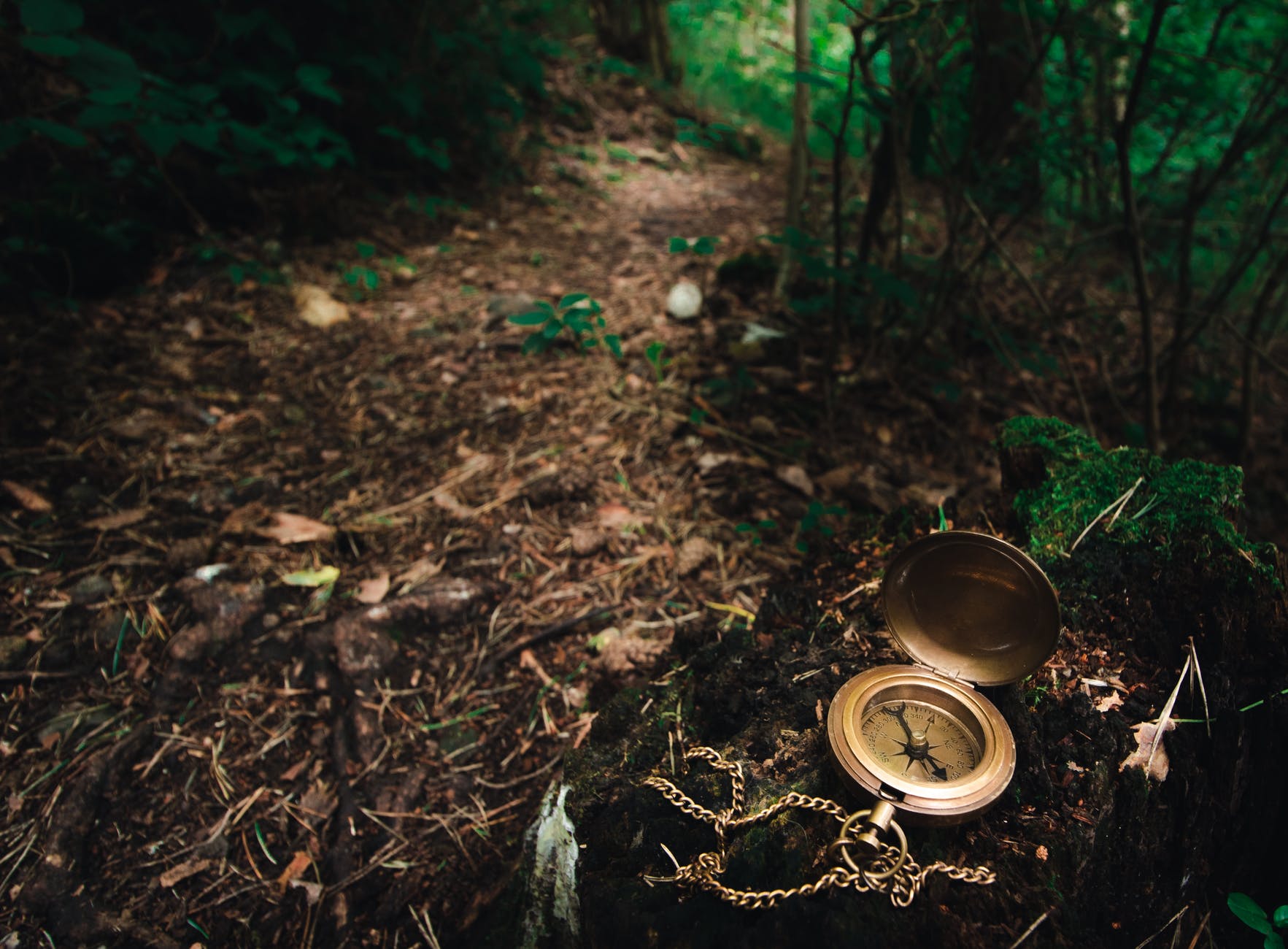Last updated on January 21, 2023
Featured photo by Deena on Pexels.com
Hello! So glad you’re back at Roots & Light and we hope you’ve enjoyed our Barriers to Spiritual Investment series. If you’ve missed any of the previous articles, you can find them all here where we chat about lack of time and lack of energy as common barriers to investing in our spiritual growth. Today we venture into the final portion of our series as we discuss lack of direction.
If you’re someone who is beginning to understand the value of investing in your spiritual life, but you’re not sure how to find your place to begin, this next part of the series is written especially for you.
Welcome.
Where are we?
Whenever we’re starting something new, or starting again with something we haven’t done in a long time, it can feel daunting figuring out where to take our first steps forward. Before we get into specifics for each of our particular first steps, it’s helpful to survey the landscape with which we come to this place. To notice where we are beginning as we venture into spiritual growth.
Spiritual growth means increased spiritual understanding. Understanding of any kind begins with curiosity.
cu·ri·os·i·ty noun
source
1. a strong desire to know or learn something.
example: “filled with curiosity, she peered through the window”
When we begin with curiosity, an infinite world of discovery and exploration becomes available to us. But if we don’t have a strong desire to know or learn something, we could spend all the time in the world reading about it, being taught about it, experiencing it, yet never understand it. It would never reach us in our interior worlds and never be the catalyst for the growth and transformation we’re hoping for.
Born Curious
As children, we are born with a propensity for curiosity. We want to know, understand, and experience the places where we live. We delight in learning new things, trying new ways of doing, and sharing those with others along the way.
There is a passage in the Gospel account by Matthew in which Jesus talks about becoming like little children to enter the kingdom of heaven.
At that time the disciples came to Jesus and asked, “So who is greatest in the kingdom of heaven?”
He called a child and had him stand among them. “Truly I tell you,” he said, “unless you turn and become like children, you will never enter the kingdom of heaven. Therefore, whoever humbles himself like this child – this one is the greatest in the kingdom of heaven. And whoever welcomes one child like this in my name welcomes me. But whoever causes one of these little ones who believe in me to fall away – it would be better for him if a heavy millstone were hung around his neck and he were drowned in the depths of the sea.
Matthew 18:1-6 CSB
Jesus tells his disciples, and those of us who are reading his words many centuries later, to turn and become like little children. Curiosity, by nature, is a humble way of living. It means we are asking questions of and seeking understanding from those with greater wisdom than we currently have.
To turn from how we are now to become like little children is no small task, though a necessary one on our road to spiritual maturity. As we mature, curiosity can go one of two ways. It can mature along with us, or it can stagnate.
Maturing Curiosity
Curiosity that is maturing grows as we grow. Our questions and investigations move on from simple concepts to those that are more complex. We see this, again, in the growth of children. First they mimic sounds they hear from those around them. They are curious about the different ways they can move their mouths. They experiment with whispering, shouting, blowing spit bubbles, laughing, crying, shrieking, repeating the same syllable over and over. But soon they can form complete sentences and use those tools they’ve acquired to make demands or ask questions. Those questions become more and more difficult for us to answer as they move on from “Cookie?” to “Where do babies come from?” to “Why does she look differently than I do?” and so on.
As we grow spiritually, this same phenomenon occurs. We may begin with questions like, “What is good and evil?” or “Who is God?” or “What is a Christian?” and move on to deeper and more complicated questions like “Why do bad things happen to good people?” or “Where is God when wars are happening and people are suffering?” or “How does the love of God really matter in my daily life?”
Paul (An Apostle of Christ to non-Jewish Christians in the early days of the Church) said this to the believers at Corinth about maturing spiritually:
When I was a child, I spoke like a child, I thought like a child, I reasoned like a child. When I became a man, I put aside childish things.
1 Corinthians 12:11 CSB
The path of healthy spiritual growth begins with humble questions about simple things and, with the tools that understanding provides, matures toward more and more complex conversations.
Stagnant Curiosity
But what if it doesn’t? Why does it seem like our curiosity wanes as we grow older?
Perhaps the mundane work of our daily lives fills up our minutes and hours and the urgent and pressing takes precedence over our questions. We’re fighting to survive or to meet that next goal and we don’t have time for reflecting on matters we can’t see. Spiritual matters can wait, right? We’ll get to them when things settle down a bit.
What about when we reach that goal and we’re living that life we hoped for? The one we spent all that time and money investing in. We’ve got the house and the career and the family and the social circles we want just the way we like them. We’ve made it. And we’re good. Who needs curiosity when you’ve got everything you want right here?
I think a lot of us get to one of these two places and just camp out. Even if we began a journey of spiritual investment in the past, it takes a back seat, or we’re content with any understandings we reached back then, or experiences we had, or maybe we have limited of each, and we come to believe where we are is all there is.
We figure we’ll just let things remain at the status quo, believing we’re doing our duty to God by showing up at Church on the weekend or opening our Bibles every now and then and reading an inspirational verse or two. Or not. Maybe we’ve read the Bible and we know what’s in it and there’s nothing else to discover. Or it’s for the preacher to know, not us. Were concerned about the practical life. The one that pays the bills and lets us spend time doing the things we want.
Perhaps the truth of it is that spiritual curiosity is risky. If we start to ask questions, our lives might have to shift a little. Or a lot. We may be confronted with conversations that are uncomfortable. We may have to take an official position. We may see ways that we’re living or thinking that aren’t as good for us or the world around us as we think they are. We might have to trade what we value for something else. Other people might reject us, ridicule us, and we might stand out as different in the circles to which we so long to belong.
So we let our curiosity stagnate. Or we purposefully ignore it because it’s a problem and we’d rather pretend it’s not even there, or not really that important.
But it is important. God created each of us to be curious about our world and about our place in it and about him. A life of curious living is a life that is vibrant and abundant. Yes, it encounters difficult questions, and many that are beyond our ability to answer. Yes, it puts us in tricky situations, many of which are uncomfortable. But isn’t challenge and adversity how things grow? Isn’t that how people grow in character and wisdom?
Isn’t that what we want for ourselves and for the people around us? Don’t we want to be good people? Don’t we want to do good things? Don’t we want to be known and loved and encouraged and supported? Don’t we want to do that for others? Don’t we want our world to work well and to bring happiness and joy?
Don’t we?
Here’s a great place to pause for a moment of self-examination. If our physical growth in the world begins with curiosity, so does our spiritual growth.
Ask: Am I curious about spiritual things?
As we ask ourselves this question, it’s important not to base our answer on how we used to feel, or how we think we’re “supposed to” feel, but on how we really feel, right now. If you’ve read this far in this article, I expect you have some level of curiosity about spiritual things or else you wouldn’t be here. If so, you’ve already started on your journey of spiritual growth!

But now what?
Reviving Curiosity
There is hope! Stagnant curiosity can be revived!
Curiosity requires purpose. It must be rooted in a goal or a target of exploration. What are we trying to discover? What question are we seeking the answer for, or what ability are we seeking to acquire? Curiosity goes in a direction for a purpose.
This is where we get into the direction we are looking for. It will be specific to each of us reading these words right now. Maybe grab a piece of paper to jot some thoughts down as you read on.
If you weren’t here for our article on weary souls, go back and take a read. Make note of the soul need you identify from working through the application exercise in that piece. Your soul need is a great place to get curious. With the purpose of getting that soul need met, you can begin to ask questions.
Perhaps a personal example will help here. The soul need I identified in that article was the need to be known. Here are some questions I’ve come up with as I’ve developed my curiosity around being known:
- Can I be fully known by people? Why or why not?
- Can I fully know myself? Why or why not?
- Who can fully know me?
- Was I even created to be fully known?
- How can I be fully known?
- What does it feel like to be fully known?
- What happens if I’m not fully known?
- Why does it matter if I’m fully known?
- Once I am fully known, then what?
Take a minute here and make a few of your own curiosity bullet points related to your soul need right now.
Need more help getting curious?
If your curiosity is out of practice, you might need more help getting those juices flowing. Here are a few directions you could look into searching as you consider your own spiritual questions.
Searching the word “seek” in the CSB translation of the Bible turns up 124 results. One of these results is the below passage, which quotes the words of Jesus:
“But seek first the kingdom of God and his righteousness, and all these things will be provided for you.”
Matthew 6:33 CSB
Here are some questions this passage might generate to spark your curiosity:
- Who is God?
- What is God king of?
- What does God’s kingdom look like?
- What sort of king is God?
- Is God my king?
- What is God’s righteousness?
- How do I seek the kingdom of God?
- What does it mean to seek first this kingdom?
Another passage quoting Jesus:
“By this everyone will know that you are my disciples, if you love one another.”
John 13:35 CSB
Possible questions:
- What does Christian love act like?
- What does Christian love feel like?
- What does Christian love look like?
- What is at the root of Christian love?
- Who is love for?
- Why would we want to be disciples of Jesus?
- What does it mean to be a disciple of Jesus?
- How will others know if we are disciples of Jesus?
- Why does it matter if we are disciples of Jesus?
- Why does it matter if we love one another?
Maybe you’re not familiar with the Bible or how to find verses like these within it. If not, try finding your curiosity in the world you observe around you.
What do you see that is broken? Wounded? Incomplete? Poor? Joyful? Wholesome? Good?
Ask…
- How did it get that way?
- Should it stay that way? Why or why not?
- Who can repair it?
- Why is it important to repair it?
- Is it even repairable?
- What makes it good?
- Where does the good originate?
- Who decides what the basis for good is?
- How do you know it is good or bad?
- Through what cultural lens do you perceive it?
- Why does it matter?
Live Curiously
Hopefully, this article has given you enough starting places to get your curiosity wheels turning if they’ve grown a bit rusty. Perhaps we’ve hit on some of your own questions, or perhaps yours aren’t listed here at all. That’s perfectly fine. The point is that you start asking the questions and caring about the answers.
In our next few articles, we’ll be providing some specific resources you can use out as you journey to answer your spiritual questions. Until then, make your lists. Ask your questions. Seek out some resources of your own and share them with us on Instagram or Facebook @rootsnlight.
As always, the Bible is the best place to begin, as it contains the truth of what God wants us to know about himself, us, and the world we live in. Another great resource is a local body of Christ-followers (also called a church) who spend time in discussion of these issues. Will they have all the answers, no. But they can be a great forum for being curious together. You may not agree with everything they say, and that’s fine. The point is to be curious and to grow into deeper and deeper relationship with God.
Until next time, keep asking all the questions!


Be First to Comment